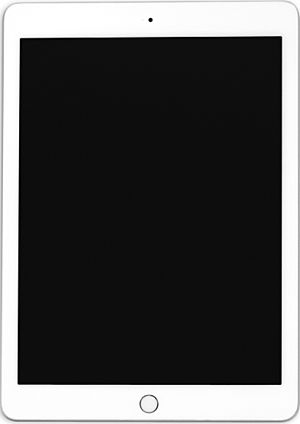IPad Air facts for kids
The iPad Air is a popular tablet computer created by Apple. It was the fifth main version of the iPad series. Apple first showed it off on October 22, 2013. When it first came out, it used iOS 7, which is Apple's operating system for iPads. It could be updated to newer versions later.
Inside, it had a powerful Apple A7 chip, which is like the tablet's brain. It also had an M7 chip to help with motion tracking. The iPad Air became available to buy on November 1, 2013. However, newer iPad software called iPadOS cannot run on this model.
The iPad Air was super thin, only 7.5 millimeters thick. That's thinner than older iPads like the iPad 2 and even the iPad Mini. It also had thinner edges around the screen, called a bezel, making it look a lot like the smaller iPad Mini. But it still had the same amazing 9.7-inch Retina Display, which makes everything look super clear and colorful.
The next version, the iPad Air 2, was released about a year later, on October 16, 2014.
 |
|
 |
|
| Developer | Apple Inc. |
|---|---|
| Manufacturer | Foxconn |
| Product family | iPad |
| Type | Tablet computer |
| Release date | November 1, 2013 |
| Discontinued | March 21, 2016 |
| Operating system | Original: iOS 7.0.3 Current: iOS 12.4.8 |
| Power | Built-in rechargeable Li-Po battery 32.4 W⋅h (117 kJ) |
| System-on-chip used | Apple A9 with 64-bit architecture and Apple M9 motion co-processor |
| Memory | 2 GB RAM |
| Storage | 16, 32, 64 or 128 GB flash memory |
| Display | 9.7 inches (250 mm) 2,048 × 1,536 px color IPS LCD display at (264 ppi) with a 4:3 aspect ratio, oleophobic coating |
| Input | Multi-touch screen, headset controls, M7 motion co-processor, proximity and ambient light sensors, 3-axis accelerometer, 3-axis gyroscope, digital compass, dual microphone |
| Camera | Front: 1.2 MP, 720p HD Rear: 5.0 MP AF, iSight with Five Element Lens, Hybrid IR filter, video stabilisation, face detection, HDR, ƒ/2.4 aperture |
| Connectivity | |
| Online services | App Store, iTunes Store, iBookstore, iCloud, Game Center |
| Dimensions | 240 mm (9.4 in) (h) 169.5 mm (6.67 in) (w) 7.5 mm (0.30 in) (d) |
| Weight | Wi-Fi: 469 g (1.034 lb) Wi-Fi + Cellular: 478 g (1.054 lb) |
| Predecessor | iPad (4th generation) |
| Successor | iPad Air 2 |
Contents
Key Features of the iPad Air
The iPad Air could run different versions of Apple's software, including iOS 12. This software lets you use all the apps and features on the tablet.
Staying Connected: Wi-Fi and Cellular
The iPad Air could connect to the internet in a few ways:
- Wi-Fi: It could connect to wireless internet networks, just like your phone or computer.
- Mobile Hotspot: It could also work as a mobile hotspot. This means it could share its internet connection with other devices, like a laptop, using Wi-Fi, a USB cable, or Bluetooth.
- Cellular (Optional): Some iPad Air models also had cellular connectivity. This allowed them to connect to the internet using mobile phone networks, similar to how your smartphone gets data. This was great for staying online when you weren't near Wi-Fi.
Apps and Entertainment
The iPad Air gave users access to the App Store. This is where you can find and download millions of mobile applications, from games to educational tools. You could also access the iTunes Store for music and movies, the iBookstore for digital books, and Game Center for playing games with friends.
Storage and Power
The iPad Air came with different amounts of storage space, from 16 GB up to 128 GB. This is where your apps, photos, and videos were saved. It had 2 GB of RAM, which helps the iPad run apps smoothly. It also had a long-lasting rechargeable battery, so you could use it for hours.
Cameras and Sensors
The iPad Air had two cameras:
- Front Camera: A 1.2-megapixel camera on the front, perfect for video calls and selfies. It could record video in 720p HD quality.
- Rear Camera: A 5.0-megapixel camera on the back, called iSight. This camera could take clear photos and videos. It had features like face detection and video stabilization to help you get great shots.
It also had many sensors, like an accelerometer and gyroscope, which helped the iPad know how it was being held and used for games. It even had a digital compass to help with navigation.
 | Emma Amos |
 | Edward Mitchell Bannister |
 | Larry D. Alexander |
 | Ernie Barnes |

